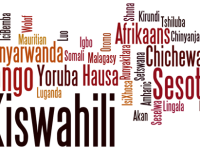 Education today is more global than ever, and eLearning is one of the big drivers behind this change. With MOOCs coming out of leading universities transmitted all over the world, teachers are able to reach a more massive audience than ever before. But as always with mass production, there is a movement in the opposite direction. Is a one-size-fits-all approach really the best way to educate, or should education materials be tailored to fit unique circumstances? Localisation is the keyword here, and the debate on its merits will be at the heart of an eLearning Africa session entitled: “Does Localisation Matter?”
Education today is more global than ever, and eLearning is one of the big drivers behind this change. With MOOCs coming out of leading universities transmitted all over the world, teachers are able to reach a more massive audience than ever before. But as always with mass production, there is a movement in the opposite direction. Is a one-size-fits-all approach really the best way to educate, or should education materials be tailored to fit unique circumstances? Localisation is the keyword here, and the debate on its merits will be at the heart of an eLearning Africa session entitled: “Does Localisation Matter?”
The linguistic situation in much of Africa, with its thousands of different languages operating on different levels of society, has long been a challenge for education. The use of national or international languages in schools does mean that governments can assure standardisation, the same learning materials can easily be used across the board, and the process of teacher recruitment and training is simplified. But the difficulty of learning in a language that is not one’s mother tongue can have a highly negative impact on learners.
In Ethiopia, Mesfin Zeme, Department Head at SIL, has been studying the challenge of mother tongue education and will present her findings at eLearning Africa. SIL is an organisation dedicated to empowering Ethiopian language communities, which currently is partnering with eleven language communities to develop mother-tongue educational materials. Zeme has collected data from two SIL-run multilingual projects and found that “while there are challenges for the mother tongue teachers to teach in a mother tongue based multilingual education programme, ignoring the mother tongue completely has many more challenges”.
Also working in Ethiopia, and in Uganda, the Maarifa Initiative aims to overcome some of these challenges, stated by its founder, Christer Gundersen, as “the question of availability of good resources and teachers, and the quality of schooling”. Maarifa works with local teachers, using crowdsourcing and micropayment, to translate open learning resources and recontextualise them, creating “a community of communities with one common goal… to create simple and light weight learning resources”.
While language is a key part of localisation so too is context. Educational resources produced for a global audience may fail to take into account local issues or cultural specificities. Learners may find such content, even if translated into their own language, hard to understand or irrelevant, leading to a lack of engagement. This is the subject that Gerry van der Hulst, director of Three Mountains Learning Advisors, Rwanda, will address in his talk entitled “Should John Cleese learn Kinyarwanda?”
The title refers to a famous and popular video series on management skills made by British comedian John Cleese, and asks the question: “Where is the African counterpart of this series where a Nigerian, Egyptian or Rwandan comedian introduces the common mistakes of African managers?”
Based on his experiences, van der Hulst will discuss ways of localising text, audio and images – and ask whether these localised materials are also suitable for international audiences. For if educators are to reap the benefits of the global reach of eLearning, it is clear that local lessons must be adapted for travel.
Does Localisation matter? Join the debate at eLearning Africa 2016. This session, one of many dedicated to the topic of learner engagement, will take place on Wednesday, May 25 at the Conference in Cairo. To find out more about the programme for eLearning Africa this year, visit the programme page.



















Yes, of course it matters. It is in fact an essential part to reach learners in their not only native language but culture as well.
Ofcourse localisation matters. And not only that you learn faster and better in your own language. Foreign examples from far away countries does not appeal to me in the way local examples doe. This effect is of course a bit dependent on the subject, but especially for subjects like agriculture, gender, management, extension services, etc.. a local recognizable context has a direct impact on uptake of your message.